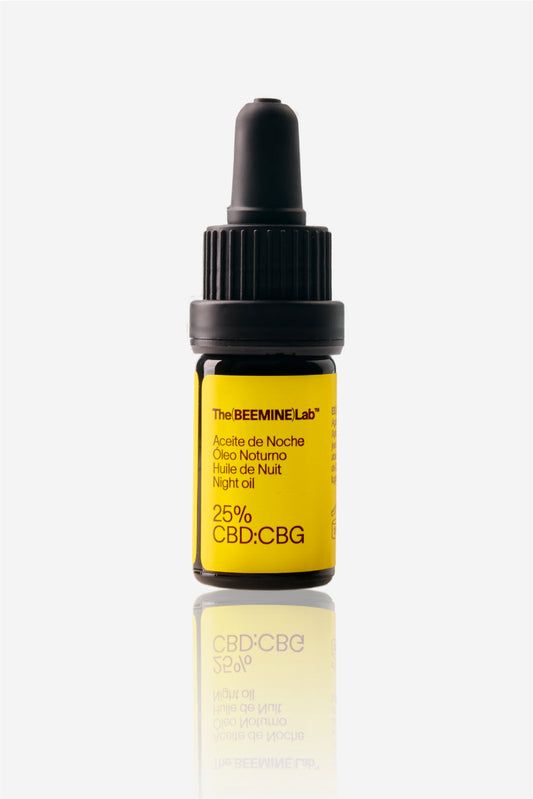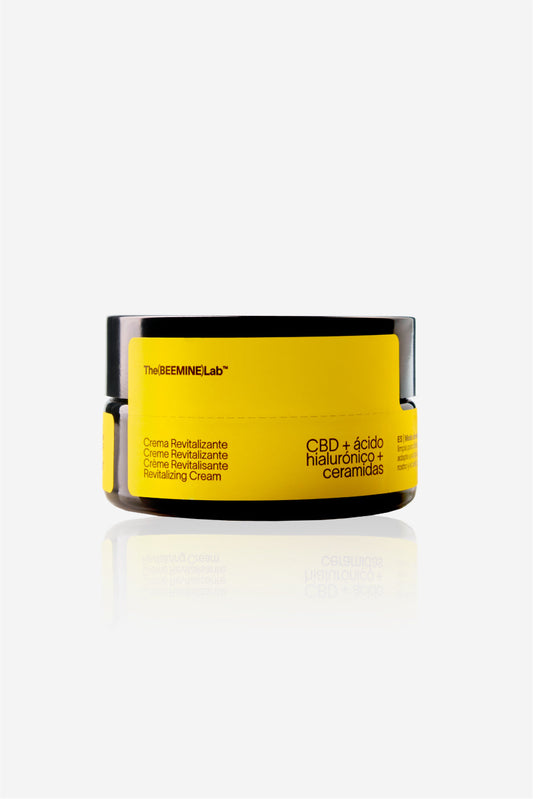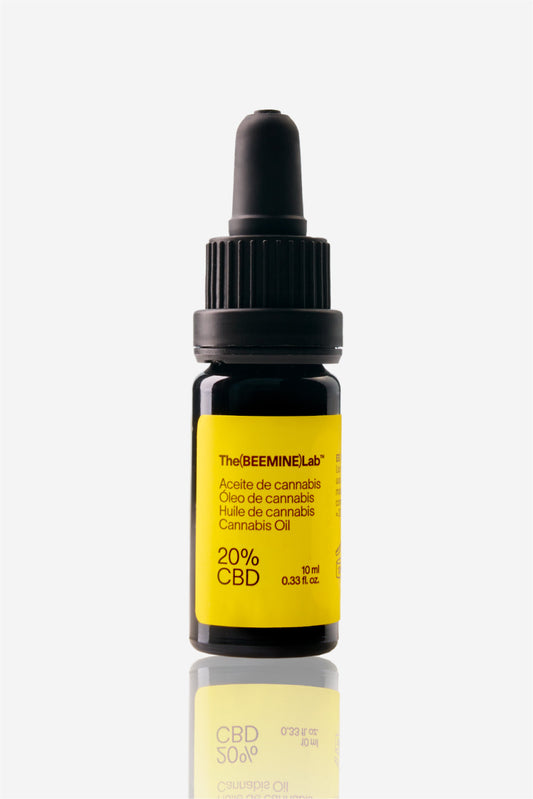What is CBD?
Cannabidiol (CBD) is a non-synthetic chemical found in the marijuana plant (Cannabis sativa). Unlike other compounds found in the plant, such as tetrahydrocannabinol (THC), CBD has no known psychoactive effects. It is usually found in the form of an oil for topical or oral use , although it is also found in creams, ointments, vaporized liquids and softgels . It is found in medicines, foods, beverages and cosmetics. Currently there is only one CBD oil -based medicine approved by the FDA (American regulatory agency) for the treatment of certain types of epilepsy, however it is being studied for the treatment of multiple conditions such as Parkinson's, diabetes, multiple sclerosis, anxiety or insomnia (1).What are the benefits of using CBD?
CBD was first isolated from Cannabis in 1940 , and unfortunately it was not considered at the time as a molecule with pharmacological activity, with almost all research at the time focusing on THC since it was the one that was psychoactive. It was later discovered that CBD has pharmacological activity by binding to certain receptors involved in the control of inflammation. The effects of CBD on inflammation could provide great benefits in various pathologies such as multiple sclerosis or rheumatoid arthritis (2). Research has also been carried out in the field of neuropsychiatry, offering promising data in the treatment of epilepsy, drug addiction, schizophrenia, post-traumatic stress, anxiety, insomnia and Parkinson's . There are also studies that relate it to a possible analgesic effect, which would also give it a benefit in the treatment of chronic pain. However, at the moment there are only certain indications and studies and trials are required to delve deeper into the matter (3 and 4). In addition, its antiemetic effect has been demonstrated , improving nausea associated with chemotherapy and thus providing certain benefits for the digestive system. As it lacks psychoactive effects and does not produce tolerance or generate dependence, it makes it a possible ally for multiple pathologies , which have been and are currently being investigated a lot (5 and 6).What are antidepressants?
Antidepressants are medications prescribed to treat depression. Depression is a serious and very common illness that affects mood and overall mental health . It can cause symptoms such as tiredness, despair, constant worry, fear, slowness in speaking or reasoning, guilt, irritability and even physical problems such as backaches or headaches. When someone suffers from depression, the way they interact socially can completely change, leading to thinking, sleeping or even eating very differently than before. This can cause insomnia or drowsiness, and also leads to weight loss or gain. In some cases, depression can lead to the sufferer wanting to end their life, feeling that life is not worth living. When we talk about depression, it is not about a passing sadness, you cannot recover overnight and it usually requires long-term treatment (7 and 8). Antidepressants can help treat depression, along with psychological therapy. In addition to being prescribed for depression, they are also used for other pathologies such as anxiety, chronic pain, sexual impotence or insomnia. There are different types of antidepressants, among which we can highlight the most commonly used today: - Selective serotonin reuptake inhibitors (SSRIs) , such as sertraline, paroxetine or citalopram. - Serotonin and norepinephrine reuptake inhibitors (SNRIs) , such as venlafaxine or duloxetine. - Atypical antidepressants that are newer and cannot be classified as vortioxetine or trazodone. - Tricyclic and tetracyclic antidepressants such as amitriptyline or doxepin, which are less used for the treatment of depression due to their low safety profile compared to SSRIs. Antidepressants generally compensate for the chemical imbalance that often occurs during depression or some associated pathologies, increasing or improving the action of the neurotransmitters involved in mood (serotonin, norepinephrine and dopamine). However, they are usually always accompanied by other types of support therapy, since they do not solve the origin of depression, anxiety, pain or insomnia (7,8 and 9).Can you take CBD with antidepressants? How does CBD interact with antidepressants?
In order to assess the safety of taking CBD with other medications, we must know how they can interact , since there are two types of drug interactions: pharmacokinetic and pharmacodynamic. Pharmacokinetic interactions refer to how a drug or substance can influence the body to assimilate, distribute and eliminate it. This means that it is possible for a drug to increase or decrease the pharmacological effect of another by decreasing its elimination or preventing its absorption. Drugs are usually eliminated after being metabolized in the liver, and this is usually done by a set of enzymes (a type of protein) called cytochrome P450. CBD could change how quickly the liver breaks down these drugs by interacting with this set of enzymes . This could change the pharmacological effects and side effects of these drugs. There are several drugs affected by this type of interaction, in the case of antidepressants we find: duloxetine, bupropion and venlafaxine . On the other hand, there are medications that can inhibit the metabolism of CBD by changing the time in which the liver metabolizes it, leading to a greater pharmacological effect and a greater risk of side effects. In the case of antidepressants, we find: fluoxetine and fluvoxamine. Despite these theoretical interactions, there are no studies that show a direct effect resulting from these interactions, therefore only theoretical conjectures can be made (10 and 11). As we have seen before, there are also pharmacodynamic interactions in which two drugs interact by having opposite effects or very similar effects . To understand this, we will use CBD as an example, which as we already know could have sedative or hypnotic effects, improving anxiety or insomnia. However, taking it together with drugs that produce similar effects could cause excessive drowsiness. In the case of antidepressants, they are likely to cause drowsiness, since some of the most commonly used ones such as sertraline, citalopram or fluoxetine tend to produce this effect. We must be very careful with this type of interaction since it could affect the ability to drive or operate heavy machinery, leading to serious accidents (7 and 10).
As we have seen before, there are also pharmacodynamic interactions in which two drugs interact by having opposite effects or very similar effects . To understand this, we will use CBD as an example, which as we already know could have sedative or hypnotic effects, improving anxiety or insomnia. However, taking it together with drugs that produce similar effects could cause excessive drowsiness. In the case of antidepressants, they are likely to cause drowsiness, since some of the most commonly used ones such as sertraline, citalopram or fluoxetine tend to produce this effect. We must be very careful with this type of interaction since it could affect the ability to drive or operate heavy machinery, leading to serious accidents (7 and 10).
Are there any harmful effects resulting from their combined use?
The use of CBD with antidepressants will probably be safe , however we must take into account everything we have mentioned above, the most relevant drug interactions would be the pharmacodynamic ones in this case, since the rest of the interactions are theoretical and no clinical data have really been recorded. Therefore , it would be advisable to space out the intake of CBD together with antidepressants to avoid enhancing the hypnotic and sedative effects of some antidepressants . You should always start with the minimum effective dose of CBD and gradually increase it over the weeks until you find the expected effect, and never outside the therapeutic range. If there are significant depressing effects, such as excessive drowsiness or slow breathing, we should reduce the dose of CBD or stop taking it to avoid accidents derived from these. In any case, the most common antidepressants do not usually have depressing effects on the central nervous system at therapeutic doses, and it is rare for problems to arise from concomitant use.Should the dosage of medication and CBD be regulated if they are combined?
As we have seen before, when interacting with some antidepressants there are theoretical pharmacokinetic interactions that could affect the metabolism of CBD or the drug in question . This could theoretically lead in some cases to the need for a dosage adjustment to avoid unwanted side effects. However, as there is only theoretical data we do not really know how this dosage adjustment should be made and if it is really necessary . Therefore, it would always be best to consult the specialist in question, who would be the psychiatrist , in case of any doubts that may arise. He must assess the risk of concomitant use of CBD and certain antidepressants, despite there being no studies that assess the clinical importance of these interactions (11). Literature:
Literature:
- https://www.mayoclinic.org/es-es/healthy-lifestyle/consumer-health/expert-answers/is-cbd-safe-and-effective/faq-20446700
- Burstein S. Cannabidiol (CBD) and its analogs: a review of their effects on inflammation. Bioorg Med Chem. 2015 Apr 1;23(7):1377-85. doi: 10.1016/j.bmc.2015.01.059. Epub 2015 Feb 7. PMID: 25703248.
- Crippa JA, Guimarães FS, Campos AC, Zuardi AW. Translational Investigation of the Therapeutic Potential of Cannabidiol (CBD): Toward a New Age. Front Immunol. 2018 Sep 21;9:2009. doi: 10.3389/fimmu.2018.02009. PMID: 30298064; PMCID: PMC6161644.
- Boyaji S, Merkow J, Elman RNM, Kaye AD, Yong RJ, Urman RD. The Role of Cannabidiol (CBD) in Chronic Pain Management: An Assessment of Current Evidence. Curr Pain Headache Rep. 2020 Jan 24;24(2):4. doi:10.1007/s11916-020-0835-4. PMID: 31980957.
- Smith LA, Azariah F, Lavender VTC, Stoner NS, Bettiol S. Cannabinoids for nausea and vomiting in adults with cancer receiving chemotherapy. Cochrane Database of Systematic Reviews 2015, Issue 11. Art. No.: CD009464. DOI: 10.1002/14651858.CD009464.pub2.
- Grimison P, Mersiades A, Kirby A, Lintzeris N, Morton R, Haber P, Olver I, Walsh A, McGregor I, Cheung Y, Tognela A, Hahn C, Briscoe K, Aghmesheh M, Fox P, Abdi E, Clarke S , Della-Fiorentina S, Shannon J, Gedye C, Begbie S, Simes J, Stockler M. Oral THC:CBD cannabis extract for refractory chemotherapy-induced nausea and vomiting: a randomized, placebo-controlled, phase II crossover trial. Ann Oncol. 2020 Nov;31(11):1553-1560. doi: 10.1016/j.annonc.2020.07.020. Epub 2020 Aug 13. PMID: 32801017.
- https://medlineplus.gov/spanish/antidepressants.html
- https://www.mayoclinic.org/es-es/diseases-conditions/depression/symptoms-causes/syc-20356007
- https://www.mayoclinic.org/es-es/diseases-conditions/depression/in-depth/antidepressants/art-20046983
- https://www.sefh.es/sefhjornadas/33_01Manejo_practico_de_las_interacciones.pdf
- TECHNICAL SHEET EPIDYOLEX 100 MG/ML ORAL SOLUTION; TOP; AEMPS







